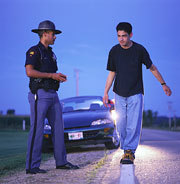Repeat Drunk Drivers: Innovative Survey Reveals What Works, What Doesn't, And What Would Make Them Stop
 |
WHAT
* Marking the first time that DUI offenders were asked, "what would make
you stop driving drunk," The Century Council completed an innovative
survey of the most dangerous sectors of the driving population, the
hardcore drunk driver.
* Top 3 actions that would "definitely make me stop drinking and driving"
- 76% responded 1 year of mandatory jail time
- 75% responded a mandatory fine of $10,000
- 70% of respondents said ignition interlocks would be an effective
deterrent.
* A majority of respondents (54%) said they would be "very likely" to
change their behavior to prevent being arrested and convicted of
subsequent drunk driving offenses if more severe sanctions had been
applied after their first DUI conviction.
* Overall the survey revealed that law enforcement and the judicial system
are working.
- An overwhelming majority (95%) of DUI offenders believe it is likely
a drinking driver will be arrested if stopped for drinking and
driving; 75% believe arrest is "very likely."
- 98% think it is likely a driver arrested for drunk driving will be
convicted; 82% feel a drunk driving conviction is "very likely."
* In an ironic twist, eighty percent of survey respondents said they worry
about other drivers who might be driving drunk.
AVAILABLE FOR INTERVIEW
* Ralph Blackman, President & CEO, The Century Council
* William P. Georges, Senior Vice President, The Century Council; former
Assistant Chief of Police, Albany, New York; 25 year background in law
enforcement
ABOUT THE SURVEY
Respondents from the participating DUI Courts had a self-reported average of 3 drunk driving arrests and 2.6 drunk driving convictions. The average blood alcohol concentration (BAC) level for these drivers was nearly 0.17, more than twice the legal limit. Methodology: A survey of 353 DUI Court Clients from ten DUI Courts across the country was conducted between October and December 2006. The DUI Court Clients were recruited in-person to participate in the survey at their respective DUI court, participation was completely voluntary.


